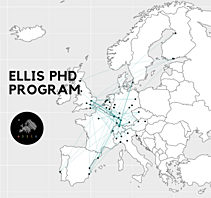More than 50 outstanding talents join the ELLIS PhD Program in 2022

The ELLIS PhD Program is expanding once again: More than 50 exceptional early-career researchers from 20 different countries have joined the program following the 2021/2022 central recruitment round.
The students will get the opportunity to conduct cutting-edge research in the field of modern AI, supervised by some of the most renowned European scientists in this field.
Launched in 2020, the ELLIS PhD Program offers outstanding young researchers from all over the world the chance to advance their scientific career in an AI network of excellence, and to contribute to fostering modern AI research in Europe. The concept has rapidly gained popularity: In its second round of central recruitment, more than 1,700 candidates expressed interest in the program – an increase of nearly 30% compared to the first round in 2020/2021. After a rigorous review and interview process, more than 50 new students have accepted an ELLIS offer. 13% of them are female candidates. Starting their PhDs in fall 2022, the new cohort will join the 130 students who are already part of the program.
“The great interest from outstanding students all over the world has shown us that we are on the right track with our program. We invest a lot of time in carefully selecting the best people. It’s a tremendous effort, but it pays off. We are extremely happy to welcome more than 50 excellent new students on board, and we are very motivated to advance modern AI research in Europe with them”, says Andreas Geiger, Chair of the ELLIS PhD & Postdoc Committee and Professor of Computer Science at the University of Tübingen.
In order to be offered a PhD position within the ELLIS network, the candidates must present an excellent academic track record in a relevant area of study. This round, more than 260 machine learning scientists were involved in ELLIS’ multi-stage review process. The strong focus on excellence is a key element of the program whose objective is to increase Europe’s competitiveness in modern AI by attracting and retaining the best talent in Europe.
Joint supervision and participation in networking events
During their PhDs, the students will benefit from joint supervision by two ELLIS advisors. Each young talent will spend at least six months at the secondary advisor’s lab, either at an academic institution in a different European country or with an industry partner. This year’s newly recruited PhD students will be supervised by 39 different primary advisors across 25 different institutions in eight countries. Moreover, the students will have the opportunity to join several networking activities in the next few years to exchange ideas with their peers as well as with senior researchers.AI research to tackle some of society’s biggest challenges While advancing the state of the art in machine learning, the students’ interdisciplinary projects also contribute to real-life challenges, for example applications in medicine, tackling consequences of climate change and issues of fairness.
One of the new students joining the ELLIS PhD program this year is Siddhartha Gairola, a pre-doctoral research fellow at Microsoft Research India. He studied computer science and engineering at the International Institute of Information Technology in Hyderabad. Siddhartha is particularly interested in building reliable systems that model visual perception with limited supervision. Such systems find application in areas such as medicine, photography, and autonomous vehicles. “I am excited to start as an ELLIS PhD student and to begin my research at the Max Planck Institute for Informatics. I liked the ELLIS model with a well-structured PhD program where a student works with two co-advisors who are leading researchers in their field”, he says. “Additionally, the application process was straightforward, and I had a great experience during the interview process. I also had two offers from top-5 schools in the USA. However, due to a better research fit and positive interactions with my advisor and his research group, I decided to go ahead with the ELLIS program. I am also looking forward to living in the heart of Europe and learning more about the lovely culture”, he adds.Mona Schirmer, another young researcher joining the program, studied statistics, applied mathematics and economics at the French Grand Ecole ENSAE and at the Humboldt University Berlin in a double degree program. Currently, she works as a data scientist at the World Bank using machine learning to assess the impact of development projects. “ELLIS is my first choice PhD program. I believe it is the optimal environment to achieve my research goals. I was very excited to see that the top researchers, whose work I am interested in, are part of the ELLIS network”, she highlights. “Besides the excellence of research of the ELLIS members, I highly value the community of fellow PhD students and the international research network that the program is embedded in. I am convinced that a platform for exchanging on research topics as well as on the general research experience is a crucial part for an enriching and successful PhD. My research interest lies in probabilistic machine learning, particularly how we can design models that optimally deal with distribution shifts in data. I am also interested in using machine learning to better understand human behaviour”, she says.
The ELLIS PhD Program is supported by the European Union’s Horizon 2020 research and innovation programme under ELISE. More information about the program: https://ellis.eu/phd-postdoc
